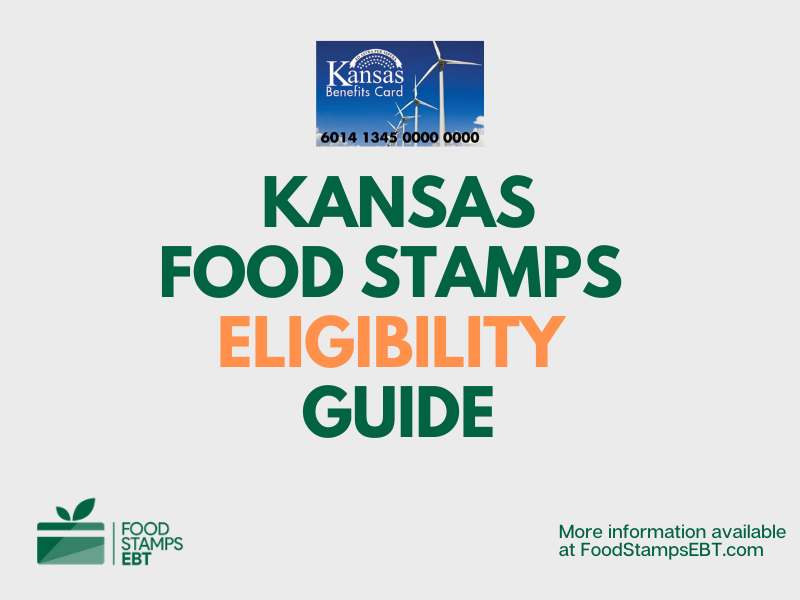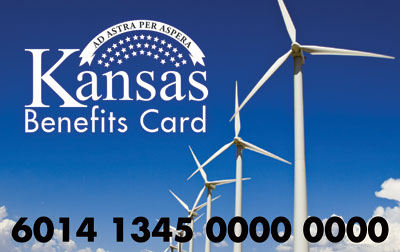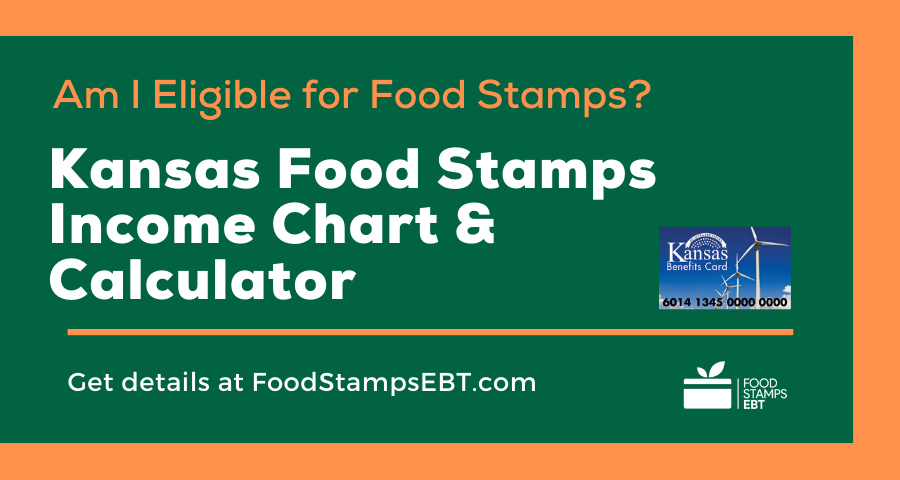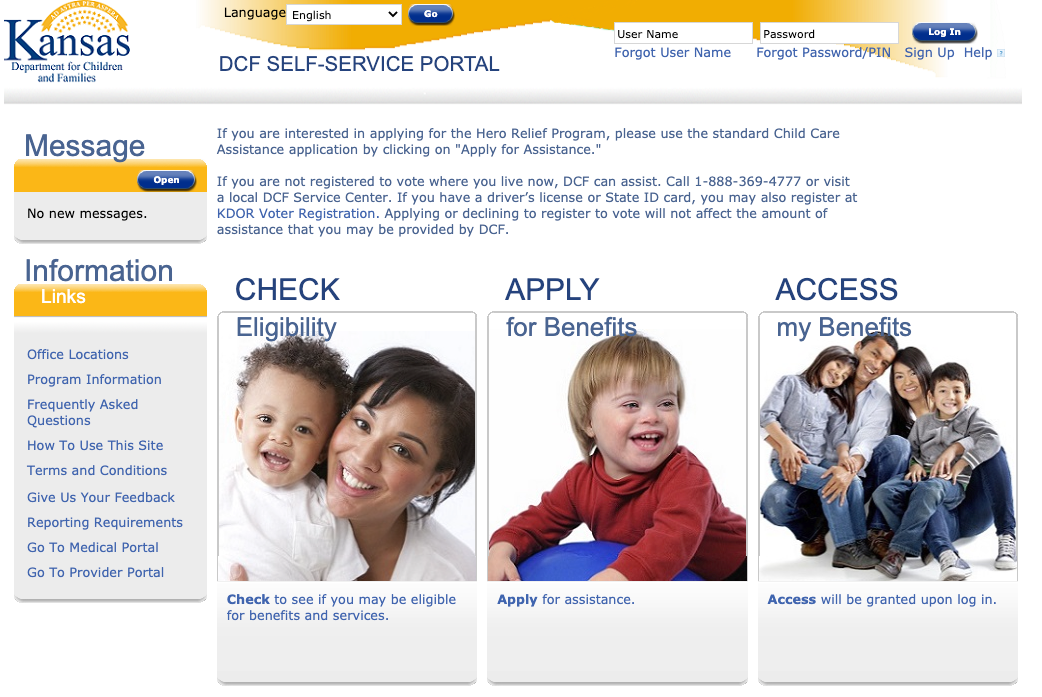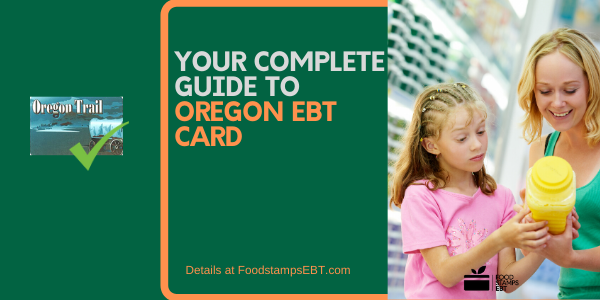The Kansas Food Stamps Program (SNAP Benefits or Food Assistance Program) helps people with little or no income. It provides benefits to eligible individuals and families to buy nutritious food. If you want to apply for Kansas Food Stamps, you have to make sure you qualify and are eligible. There are strict eligibility requirements that you must follow in order to be approved for SNAP. In this article, we will discuss the guidelines for Kansas Food Stamps Eligibility and income requirements for a successful application.
This post will cover:
- About Kansas Food Stamps Program
- Kansas Food Stamps Eligibility Guidelines
- Food Stamps Income Chart
- What can I buy with EBT in Kansas?
- How to Apply for Kansas Food Stamps
The Food Stamps Program
SNAP is the Supplemental Nutrition Assistance Program, previously known as “food stamps.”
If you don’t earn enough money to cover food costs for you and your family, you might qualify for monthly SNAP benefits.
Should you be approved for benefits, your food stamps allocation can be used to buy produce, meat, dairy, bread, and other foods on the approved list.
How much you receive in SNAP benefits is based on your income and how many people are in your household.
The maximum monthly allotment for a family of four is $680.
Kansas Food Stamps Program
In the state of Kansas, the food stamps program is run by the Kansas Department for Children and Families (DCF).
The program also goes by the name Kansas Food Assistance Program.
If you meet the program eligibility guidelines, you will get a special debit card (called the Kansas EBT Card or Kansas Benefits Card) as shown below.
The EBT card is loaded monthly with the money you qualify for. You can then use the card to purchase food at grocery stores and other approved locations.
The amount of money a household gets may depend on three things:
- household income from all sources (earned and unearned) such as money you get from a job, Social Security, SSI, or interest
- how many people live in your household
- where you live
There are strict eligibility requirements that you must follow in order to be approved for Food Assistance. We have detailed those guidelines below:
Kansas Food Stamps Eligibility Guidelines
In order to be approved for SNAP benefits in Kansas, you have to meet the following eligibility requirements:
Proof of Identity
The identity of the person applying must be verified for SNAP.
Some examples of proof of identity include government-issued identification card or driver’s license, work or school ID, voter registration card, or birth certificate.
Work Rules
With certain exceptions, able-bodied adults between 16 and 60 years of age must register for work, accept an offer of suitable work, and take part in an employment and training program when referred to one by the local department of social services.
In addition, unless exempt, SNAP benefits are limited to 3 months within a 36 month period for Able-Bodied Adults without Dependents (ABAWD’s) between the ages of 18 and 50 who are not working or participating in an approved Employment & Training Program (E&T) an average of 20 hours per week.
Residency
The applicant must live in the state they are applying for benefits in.
Citizenship
U.S. citizens and some non-citizens are eligible for SNAP benefits.
Some legal immigrants are ineligible for SNAP benefits.
Even if some members of the household are not eligible, household members who are eligible may still be able to get SNAP benefits.
In addition, dependents of an ineligible immigrant are often eligible.
Social Security Numbers
You will have to provide a Social Security number for every household member, including children, except for undocumented immigrants applying on behalf of others.
If any household member, other than an undocumented immigrant does not have a Social Security number, he or she will have to apply for one.
Child Support Requirement
You may be required to cooperate with the state in establishing paternity and providing child support.
Resource Test
Some households may be subject to a resource test.
The asset limit is $2,250 for most households and $3,500 for households containing a member who is disabled or 60 years or older.
Many types of assets are not counted such as the home you occupy and its lot, household goods, and money in retirement savings accounts or pension plans.
Countable assets include cash on hand, money in checking or savings accounts, certificates of deposit, U.S. savings bonds, stocks, and bonds.
Income Test
Income is one of the most important criteria for Kansas Food Stamps Eligibility.
Your total income, before taxes or any other subtractions, is called gross income.
However, the program allows certain subtractions from your gross income, called deductions.
These can be for things you pay for like housing costs, child support payments,
medical expenses over $35 a month for elderly or disabled people, or childcare costs.
The amount left over after these deductions is called net income.
There are two income tests: gross income and net income limit. If your household has a person who is 60 or older or who is disabled, you only need to meet the net income limit.
If everyone in your household receives Supplemental Security Income
(SSI) or Temporary Assistance for Needy Families (TANF), you do not need to meet any
of the income limits.
Kansas Food Stamps Income Chart
Use the chart below to find out whether your household makes less than the gross monthly income limit.
You may be eligible for food stamps if your total income falls below the appropriate gross income limits for your household size.
Your caseworker will determine which income limit applies to your household.
The chart below shows you the Gross Income and Net Income levels required for qualification, based on the number of people in each household.
| Household Size | Gross monthly income (130 percent of poverty) |
Net monthly income (100 percent of poverty; test for SNAP households with elderly and disabled members) |
| 1 | $1,383 | $1,064 |
| 2 | $1,868 | $1,437 |
| 3 | $2,353 | $1,810 |
| 4 | $2,839 | $2,184 |
| 5 | $3,324 | $2,557 |
| 6 | $3,809 | $2,930 |
| 7 | $4,295 | $3,304 |
| 8 | $4,780 | $3,677 |
| Each additional member | (+486) | (+374) |
Deductions:
After adding all of your household’s countable income, the case manager will subtract certain deductions. The following deductions are allowed for all households:
- standard deduction;
- 20 percent of earned income;
- actual costs of dependent care costs for children and disabled adults if this care is needed so that a household member can work, look for a job, or get training or education leading to a job;
- legally owed and paid child-support payments;
- shelter expenses and utility expenses;
- medical expenses over $35 a month for household members who are age 60 or older or receiving certain disability payments.
How Much in Food Stamps will I Get?
If you are approved for food stamps in Kansas, how much in benefits you get partly depends on the number of people in your household.
The table below shows you the maximum amount in benefits you may receive if you are approved, based on the number of people in your household.
| Household Size | Maximum Monthly Benefit | Estimated Average Monthly Benefit |
| 1 | $204 | 138 |
| 2 | $374 | 260 |
| 3 | $535 | 401 |
| 4 | $680 | 477 |
| 5 | $807 | 560 |
| 6 | $969 | 673 |
| 7 | $1,071 | 656 |
| 8 | $1,224 | 927 |
| Each additional member | (+153) |
Who CANNOT Apply for Food Stamps?
You are not eligible for Kansas Food Stamps if you fall under one or more of these:
- If you have been convicted of drug trafficking
- Are running away from a felony warrant
- Have intentionally violated a court-ordered program
- Are a student in an institution of higher education (there are exceptions if you are working, a single parent, or other special cases). Have committed food stamps fraud or have broken Food Assistance Program rules on purpose
- You are are a non-citizen without a qualified status
What can I buy with EBT in Kansas?
As with every government program, there are dos and don’ts. That is true for the Food Assistance Program.
Here’s what you can and cannot buy with your food stamps allocation:
Foods You Can Buy With Kansas EBT Card (Food Stamps Card)
- breads and cereals
- fruits and vegetables
- meats, fish and poultry; and
- dairy products
- Seeds and plants to produce food for the household to eat
- Soft drinks, candy, cookies, snack crackers, and ice cream
- Seafood, steak, and bakery cakes
- Energy drinks that have a nutrition facts label
- Energy drinks that have a supplement facts label are classified by the FDA as supplements and are therefore not eligible
What you CANNOT buy with the Kansas EBT Card (Food Stamps Card)
-
-
- Beer, wine, liquor, cigarettes or tobacco
- Any nonfood items, such as pet foods, soaps, paper products, diapers, and household supplies
- Vitamins and medicines
- Food that will be eaten in the store
- Hot foods
- Live animals
-
NOTE: In some areas, restaurants can be authorized to accept SNAP benefits from qualified homeless, elderly, or disabled people in exchange for low-cost meals.
It is very important that you only buy the foods allowed under the Food Stamp program.
Engaging in any illegal use of the EBT card may cause you to lose your benefits.
And once they are revoked, you will never be allowed on the program or be eligible to apply for Food Stamps again.
If you meet the Florida Food Stamps Eligibility requirements and want to apply for Food Stamps, click here.
How to Apply for Kansas Food Stamps
There are 3 ways you can apply for food stamps in Kansas.
Option 1 – Apply online
You can apply online through the DCF Self-Service Portal – as shown in the image below.
If you have an account, you can log in or create your DCF Self-Service Portal Account. Click here to be taken to the website.
Option 2 – Apply at DCF Office Near You
You can apply in person at the Kansas Department for Children and Families (DCF) office near you. Click here to locate a DCF office.
Option 3 – Download Kansas Food Stamps Application
You can download an application, complete it, and mail it to your county DCF office or submit it in person.
What happens next?
The application process begins the day the food stamps office receives your signed application.
You will be asked to come to the office for an interview or participate by phone if you are unable to come to the office.
In addition, you will be asked for various types of documents such as:
- proof of your identity
- a proof of your residence
- proof of Social Security numbers for all people on your application
- other types of documents depending on your circumstances.
The caseworker will tell you what you need to bring to the interview or what documents you need to send them.
Decision
After your interview, if it is determined that you are eligible for SNAP, you will receive an Electronic Benefits Transfer (EBT) card within 30 days.
If you have little or no income or savings, you could have your EBT card within seven days.
On the other hand, if it is determined that you are not eligible, a notice will be sent to you telling you why your application was denied.
Kansas Food Stamps FAQs
Here are the most frequently asked questions about Kansas Food Stamps.
Who Can Apply for Food Stamps in Kansas?
If you work but have a low income, you can apply for Food Assistance benefits.
In addition, if you are unemployed, you may be eligible for SNAP
Also, seniors over the age of 60 and persons with disabilities may be eligible.
Finally, persons with disabilities such as those receiving Supplemental Security Income (SSI), Social Security Disability payments may be eligible.
What Information Do I Need to Apply for SNAP in Kansas?
You may need to provide the following information to complete your application:
- Identification, such as a birth certificate or
driver’s license - Non-citizen documentation, if you are not
a United States citizen - Social Security number for you and any
household members who are applying for
food assistance - Proof of earned and unearned income
- Proof of assets, such as checking and
savings account balances
How long does it take to process my application?
The county department has up to 30 days from the date you turn in your application to notify you of a decision about your eligibility for food assistance.
In some cases, if you have little or no income and resources, you may be entitled to expedited service and then a decision is made in 7 days from the date you turn in your application.
You will be told when a decision will be made on your application when you are interviewed.
Do I have to be a U.S. citizen to apply?
U.S. citizens and certain legal non-citizens may be eligible for food assistance benefits when other eligibility requirements are met.
If you are not eligible due to immigration status, your legal resident or citizen children may still qualify.
When will I receive my Kansas food stamps benefits?
Your benefits will be deposited onto your EBT card according to the schedule below:
| If the First Letter of your Last Name is | Benefits are deposited on the |
| A or B | 1st of the month |
| C or D | 2nd of the month |
| E, F, or G | 3rd of the month |
| H, I, or J | 4th of the month |
| K or L | 5th of the month |
| M | 6th of the month |
| N, O, P, Q, or R | 7th of the month |
| S | 8th of the month |
| T, U, or V | 9th of the month |
| W, X, Y, or Z | 10th of the month |
Once your benefits are deposited into your account, you can begin using them with your Kansas EBT card to purchase eligible food items.
For a full list of approved food items, see the Food Stamps Eligible Food List here.
Kansas Food Stamps Eligibility Summary
We hope this post on Kansas Food Stamps Eligibility was helpful.
If you have further questions about Kansas Food Stamps, please let us know in the comments section below.
Be sure to check out our other articles about EBT, including How to get 50% OFF Amazon Prime for EBT Cardholders and Medicaid Cardholders and EBT Discounts and Free Stuff.
